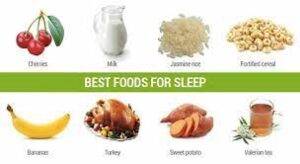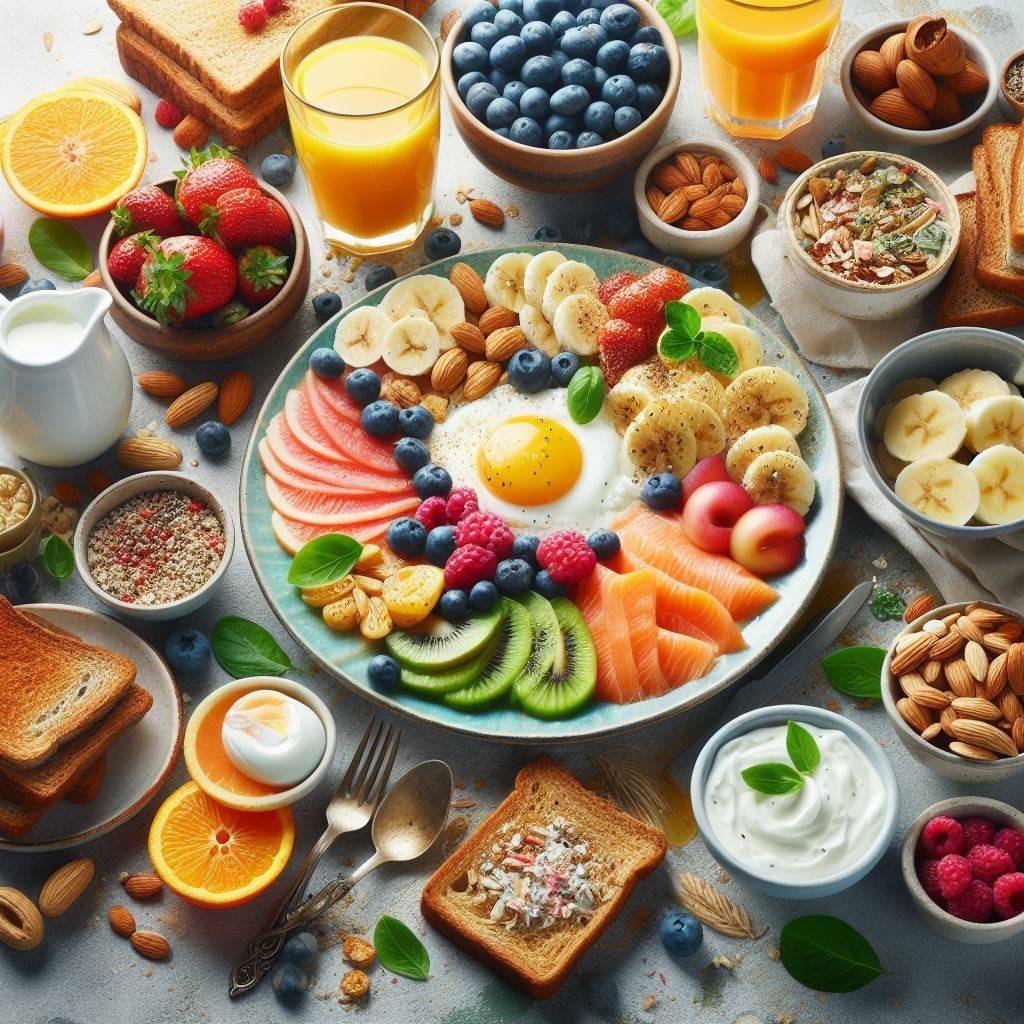Discover the top 10 foods to eat before bed for a restful night’s sleep. Improve your sleep quality with these bedtime snacks.
Introduction to Foods to Eat Before Bed
Best foods to eat before bed – A night’s sleep is critical to maintaining our physical, mental, and emotional well-being. However, many of us struggle to fall or stay asleep, leading to fatigue, mood swings, and decreased daily productivity. What we eat before bed can dramatically alter our sleep quality, among other variables.
This article reviews the top calming, stress-reducing, and sleep-inducing foods before turning them in for the night. Whether you have insomnia or want to sleep better, this post is for you.
The Science of Sleep: How Nutrition Can Affect Your Sleep Quality

Getting a sufficient amount of sleep is necessary for both our health and our well-being.
While we sleep, our bodies undergo various processes, including cell repair, hormone regulation, and memory consolidation.
The four stages of sleep serve different purposes.
Firstly, the lightest stage of sleep
is when we are still alert and can be easily awakened. During this stage, our brainwaves slow down, and our muscles relax.
The second sleep stage is a little deeper.
When our heart rate and body temperature decrease. Brain waves slow down, and we become less aware of our surroundings.
Third is slow-wave sleep.
During this stage, our brainwaves become even slower, and our muscles are completely relaxed.
It isn’t easy to wake up from this stage of sleep.

Finally, is REM (rapid eye movement) sleep
when our brain becomes more active, and we begin to dream.
Our muscles are paralyzed during this stage, which prevents us from acting out our dreams.
Nutrition can have a significant impact on sleep quality.
Tryptophan, an amino acid, helps the body manufacture serotonin, which induces sleep.
Foods high in carbohydrates can also promote insulin release, increasing tryptophan uptake in the brain. Food timing and quantity affect sleep. Eating a big dinner before night might cause indigestion and make sleeping hard. Hunger can also impair sleep.
Top 10 Foods to Eat Before Bed: Promote Relaxation and Sleepiness

Eating the right foods before bed can significantly affect the quality of your sleep.
Here are some of the top foods to eat before bed to promote relaxation and sleepiness:
Turkey
Turkey has many amino acids, tryptophan, which helps the body make serotonin. a neurotransmitter that promotes relaxation and sleepiness. A little turkey before bed can help you sleep faster. Chicken, fish, nuts, and seeds contain tryptophan.
Bananas
Magnesium and potassium in bananas calm muscles and encourage sleep. Tryptophan makes them a good bedtime snack. Dark leafy greens, almonds, and entire grains contain magnesium.
Tea with Chamomile
Chamomile tea has been consumed as a soothing nightcap for hundreds of years. It contains an antioxidant called apigenin, which can promote relaxation and reduce anxiety. Drinking chamomile tea before bed helps you relax and fall asleep.
Almonds
It is the best Food to Eat Before Bed. as magnesium in almonds relaxes muscles and reduces anxiety. Protein and healthy fats help stabilize blood sugar and avoid nighttime hunger. Cashews, pistachios, and walnuts also provide magnesium and protein.
Tart Cherry Juice
It contains melatonin, which helps control circadian rhythms. A modest glass of sour cherry juice before bed can aid in inducing and maintaining sleep. Other foods high in melatonin include oats, rice, and tomatoes.
Cottage Cheese
Cottage cheese is high in casein protein, which the body digests more slowly and thus keeps you feeling fuller longer. It’s a fantastic bedtime snack because of the tryptophan it contains.
Honey
Honey contains glucose, which lowers brain orexin. Orexin is a neurotransmitter that promotes wakefulness, so reducing its levels can help you feel sleepy. A teaspoon of honey in warm milk or tea can make for a soothing bedtime drink. so the honey is one of the top foods to eat before bed
Kiwi
Kiwis are packed with vitamins and minerals, including vitamin C and serotonin. Serotonin helps to regulate sleep and mood, making kiwis a successful choice for a pre-bedtime snack.
Pumpkin Seeds
Pumpkin seeds contain magnesium, which relaxes muscles. They are also a good source of tryptophan and protein, making them a satisfying and sleep-promoting snack.
Whole Grain Bread
The complex carbohydrates found in whole-grain bread have been shown to increase levels of the feel- brain chemical serotonin. Additionally, the tryptophan and fiber in this dish might keep you feeling full and content all through the night.
Hummus
The amino acid tryptophan, found in plentiful supply in hummus, has calming and sleep-inducing effects.
Warm milk
Milk contains tryptophan, which can help promote relaxation and sleepiness. Warm milk before bed is another simple way to add coziness and relaxation to your nightly routine. It’s important to note that the quantity and timing of these foods can also affect sleep quality. Eating a large meal close to bedtime can lead to discomfort and indigestion, making it difficult to fall asleep. It’s also important to avoid foods high in caffeine or sugar, as they can disrupt sleep.

What foods to avoid before bed?
What you eat and don’t do before bed affects your sleep.
Here are some foods and beverages to avoid before bedtime:
Caffeine
Caffeine is a stimulant. Therefore, it may be difficult to sleep after consuming it.
Coffee, tea, chocolate, and energy drinks should all be avoided at least four to six hours before night.
Alcohol
While alcohol may initially make you sleepy, it can disrupt sleep later at night. It can cause frequent awakenings, decreased sleep quality, and even snoring and sleep apnea. Therefore, avoid alcohol before bedtime or limit your intake to one or two drinks several hours before bedtime.
Spicy or Fatty Foods
Indigestion, heartburn, and bloating from spicy or fatty foods might disrupt sleep.
Eating something light and low in calories about two to three hours before bed is best.
High-Sugar Foods
Sugary foods can boost blood sugar quickly, causing a crash that I think will interrupt sleep.
Avoid consuming high-sugar foods such as sweets, sugary drinks, and desserts before bedtime.
Large Meals
Eating enormous meals before night can induce pain, bloating, and indigestion, making falling and staying asleep hard. Have your last meal at least 2-3 hours before night and choose light, easy-to-digest items. Avoiding these foods and drinks before bedtime will help you sleep better and wake refreshed.
Tips for a Good Night’s Sleep:
Create a Sleep-Conducive Environment and Develop a Relaxing Bedtime Routine While eating the right foods before bed can help improve your sleep quality, You can do other things to ensure a night’s rest. Here are some tips:
Stick to a set time to sleep.
Even on the weekends, keep a regular bedtime and wake time.
This improves the quality of your sleep by resetting your internal clock.
Create a relaxing bedtime routine
Take a warm bath, read a book before bed, or practice yoga or meditation.
This can help your body relax and prepare for sleep.
Keep your bedroom cool, muted, and dark
A cool, muted, and dark environment can help promote sleep. With a comfy mattress, pillows, and blankets, make your bedroom sleep-friendly.
Reduce screen time before bedtime
Screen blue light might disturb your sleep-wake cycle, making sleeping more difficult at night. Avoid using electronic devices before bedtime, and consider using a blue light filter on your devices.
Exercise regularly
As long as you don’t exercise too close to bedtime, regular exercise can help improve the quality of your sleep. Get at least 30 minutes of exercise most days of the week. Following these techniques can enhance your sleep quality and length and help you wake up refreshed and energized. Remember, getting a night’s sleep is crucial for your overall health and well-being.
Conclusion
Eating the right foods before bed can significantly impact the quality of your sleep. You can choose foods like bananas, nuts, cherries, turkey, and warm milk to promote relaxation and better sleep. Caffeine, alcohol, hot and fatty foods, high-sugar foods, and heavy meals before bedtime should also be avoided. Sleep habits are essential for improving the quality of your sleep. These habits include sticking to a sleep schedule and creating a relaxing bedtime routine. Keep your bedroom cold, muted, and dark, limit screen time before bed, and exercise regularly to improve sleep. Small food and lifestyle adjustments can improve your sleep, which is vital to your health. Consider reaching for a sleep-promoting snack and practicing sleep habits for a better night’s rest.
References
https://link.springer.com/article/10.1007/s40279-014-0147-0



